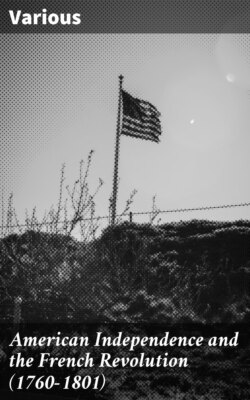Читать книгу American Independence and the French Revolution (1760-1801) - Various - Страница 22
На сайте Литреса книга снята с продажи.
THE CITY OF LONDON AND THE EARL OF CHATHAM ON PARLIAMENTARY REFORM (1770).
Source.—Letters of Junius. London: G. Bell and Sons. 1910. Vol. i.
ОглавлениеTable of Contents
At a Common Council holden on the 14th of May, 1770, it was resolved: “That the grateful thanks of this court be presented to the Right Hon. William Earl of Chatham, for the zeal he has shown in support of those most valuable and sacred privileges, the right of election, and the right of petition; and for his wishes and declaration, that his endeavours shall hereafter be used that parliaments may be restored to their original purity, by shortening their duration, and introducing a more full and equal representation, an act which will render his name more honoured by posterity than the memorable successes of the glorious war he conducted.”
To this vote of thanks the Earl of Chatham made the following reply to the committee deputed to present it to his Lordship:
Gentlemen,
It is not easy for me to give expression to all I feel on the extraordinary honour done to my public conduct by the city of London; a body so highly respectable on every account, but above all, for their constant assertion of the birthrights of Englishmen in every great crisis of the constitution.
In our present unhappy situation my duty shall be, on all proper occasions, to add the zealous endeavours of an individual to those legal exertions of constitutional rights, which, to their everlasting honour, the city of London has made in defence of freedom of election and freedom of petition, and for obtaining effectual reparation to the electors of Great Britain.
As to the point among the declarations which I am understood to have made, of my wishes for the public, permit me to say there has been some misapprehension, for with all my deference to the sentiments of the city, I am bound to declare, that I cannot recommend triennial parliaments4 as a remedy against that canker of the constitution, venality in elections; but I am ready to submit my opinion to better judgment if the wish for that measure shall become prevalent in the kingdom. Purity of parliament is the corner-stone in the commonwealth; and as one obvious means towards this necessary end is to strengthen and extend the natural relation between the constituents and the elected, I have, in this view, publicly expressed my earnest wishes for a more full and equal representation by the addition of one knight of the shire in a county, as a further balance to the mercenary boroughs.
I have thrown out this idea with the just diffidence of a private man when he presumes to suggest anything new on a high matter. Animated by your approbation, I shall with better hope continue humbly to submit it to the public wisdom, as an object most deliberately to be weighed, accurately examined, and maturely digested.
Having many times, when in the service of the crown, and when retired from it, experienced, with gratitude, the favour of my fellow-citizens, I am now particularly fortunate, that, with their good liking, I can offer anything towards upholding this wisely-combined frame of mixed government against the decays of time, and the deviations incident to all human institutions; and I shall esteem my life honoured indeed, if the city of London can vouchsafe to think that my endeavours have not been wanting to maintain the national honour, to defend the colonies, and extend the commercial greatness of my country, as well as to preserve from violation the law of the land, and the essential rights of the constitution.
